ARTICLE 106: THE LANGUAGE OF COFFEE – THE LANGUAGE OF LIFE
Coffee functions as a form of language, enabling people to communicate, connect socially, and foster the continual development of human language.
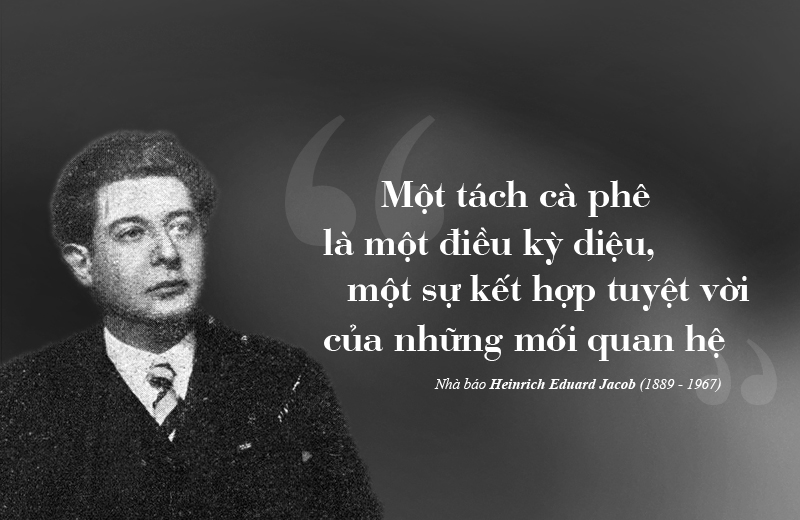
A cup of coffee is a miracle, a wonderful combination of relationships. — Journalist Heinrich Eduard Jacob (1889–1967)
A System of Communication and Expression of Reverence for the Divine
Originating in Ethiopia in the 9th century, coffee became widespread throughout the Islamic world by the 15th century. In the early history of coffee, this beverage that provided alertness and stimulated creativity was regarded as a sacred drink. Coffee, coffee rituals, coffee grounds, along with poetry and prayers, formed a system of communication that connected the worshipping community with the divine. During religious practices, coffee heightened spiritual connection, expressed reverence, and conveyed the worshippers’ desire for protection and blessings.
The Oromo people, who make up more than one-third of Ethiopia’s population, believe that the first coffee plant sprouted from the tears of Waaqa (the Sky God). As such, coffee holds a central role in all religious practices related to the lifecycle of an Oromo individual, from birth, naming, coming of age, marriage, to death. Three times a day—morning, noon, and evening—the Oromo perform a coffee offering ritual and pray to Waaqa for protection and blessings: “May the coffee pot bring peace, may the coffee pot help our children grow, may it bring us prosperity. Protect us from evil spirits, grant us rain and vegetation.” For the Harari people, who live in an important cultural and commercial center of Ethiopia, coffee rituals are carried out with the belief that the divine will bless them with a new life filled with fresh creative ideas.
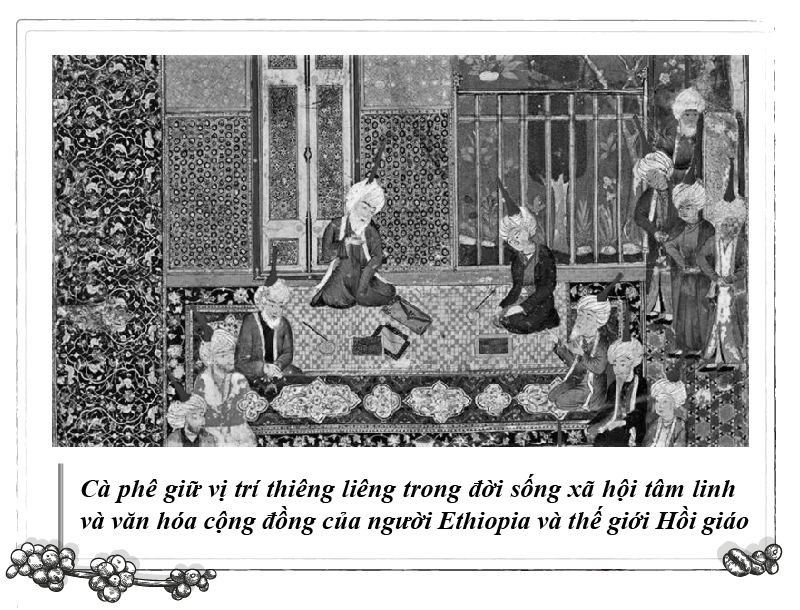
Coffee holds a sacred place in the spiritual, social, and cultural life of the Ethiopian people and the Islamic world.
With faith in the divine and the properties of coffee, the act of enjoying coffee has become a traditional ritual, a spiritual ceremony embodying aspirations for prosperity and peace in Ethiopian and Arab cultures.
By the mid-13th century, coffee had spread throughout the Islamic world, helping worshippers stay alert, energized, and spiritually connected to the divine during Dhikr rituals. They referred to this state as “marqaha”, an Arabic word meaning “gnostic happiness.” Coffee rituals were performed to express devotion to God, seek blessings, and draw closer to the divine realm. The Sufi Muslim community believed that drinking coffee and praying with devotion led to the experience of “Qahwat al-Sufiyya”, meaning “the joy of witnessing mysteries and receiving great revelations.” Upon completing this spiritual state, individuals would return to their existence and fulfill their designated missions.
Other religions, such as Regla Lucumí, New Orleans Voodoo, and Haitian Vodou, also regard coffee as a sacred offering to their deities. Coffee is often presented as a morning offering to ancestors and gods, with the hope of starting the day auspiciously. Coffee grounds are sometimes added to candles or water, symbolizing opportunities, transformation, and rapid progress.
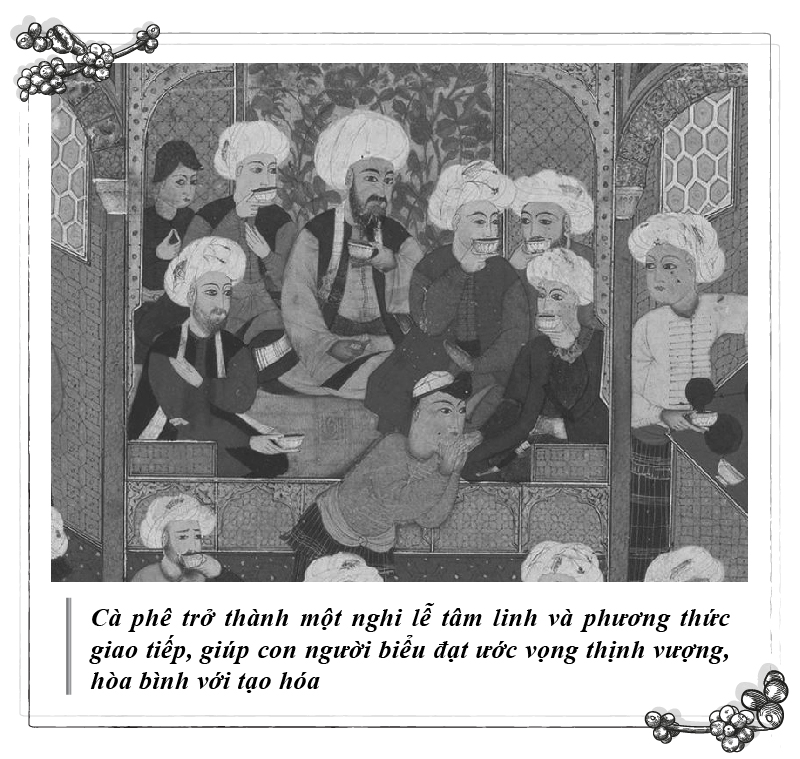
Coffee has become a spiritual ritual and a means of communication, allowing people to express their aspirations for prosperity and peace to the Creator.
In his treatise Coffee as a Social Drug, leading coffee history expert Professor Steven Topik wrote, “The original purpose of drinking coffee was to transcend the material world and find peace.” Coffee began as a mere beverage but quickly evolved into a means of communication for humanity in its search for the “divine essence.” The beliefs associated with coffee became a way for people to express their deepest aspirations and faith.
A Medium for Connection and the Development of Social Language
Throughout its 12 plus centuries of history, coffee and coffeehouses have played roles akin to language, though they are not fundamental forms of communication like spoken language or nonverbal behavior. Coffee and coffeehouses have connected people, facilitated interpersonal communication, and served as tools for intellectual exchange, fostering the development of various fields. This, in turn, has led to the creation of new vocabulary, terminologies, and concepts.
In the 16th century Ottoman society, coffee was an essential beverage, and coffeehouses were hubs where people from all classes, religions, and professions gathered to converse and exchange knowledge. When coffee reached Europe in the 17th century, it became a source of awakening and creativity, closely associated with the intellectual class. European coffeehouses operated as cultural, academic, and social spaces, connecting people across society. From ordinary citizens to philosophers, writers, artists, politicians, and merchants, coffeehouses provided a venue for connection. Over cups of coffee, in the open and free atmosphere of the coffeehouse, individuals engaged in conversations, freely shared personal views, introduced fresh perspectives, and disseminated knowledge throughout society.
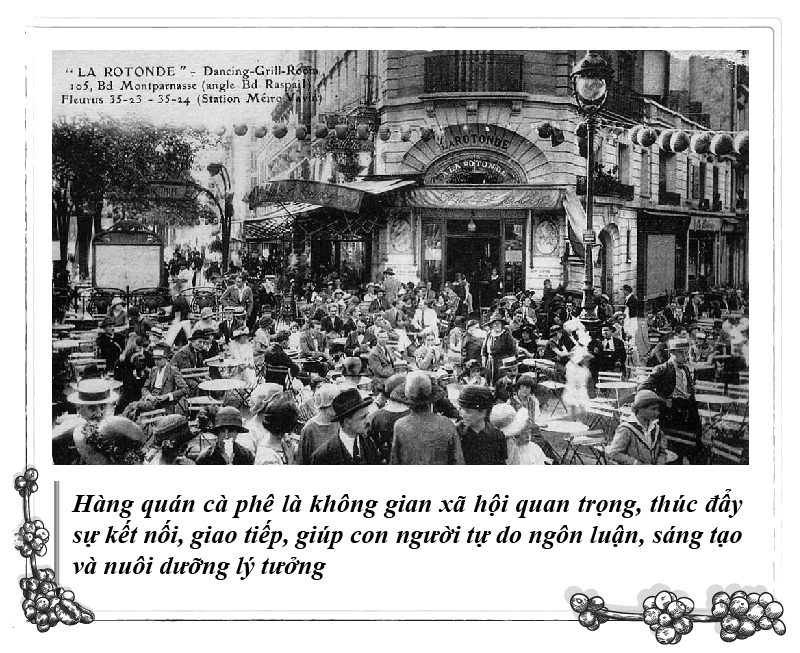
Coffeehouses are vital social spaces that foster connection and communication, enabling people to freely express themselves, unleash creativity, and nurture ideals.
First emerging in Ethiopia, coffee began to inspire the development of vocabulary and concepts describing its form, aroma, and the activities tied to coffee rituals. As coffee flourished in the Ottoman Empire, establishing its own coffee culture and civilization, a specialized system of terminology surrounding coffee continued to take shape—particularly in the domains of tools, brewing methods, and the Ottoman coffee experience.
As coffee made its way into Europe, its stimulating effects contributed to the Enlightenment and the Industrial Revolution, cementing its importance in social life. In the spirit of celebrating creativity, exploring new ways of living, and acknowledging coffee’s unique value, people undertook continuous research on the beverage.
No longer viewed solely as a drink or a competitive trade commodity, coffee came to be recognized as a “subculture” with its own history, discourse, and philosophy. In countries with distinct coffee cultures such as Italy, France, and England, coffee became a subject of fascination for researchers and experts. Consequently, a plethora of new concepts, vocabulary, and specialized coffee-related terminology emerged, encompassing coffee varieties, cultivation techniques, raw material selection, processing technologies, brewing tools, preparation methods, coffee beverages, enjoyment styles, and service etiquette. Together, these elements contributed to the creation of a unique “coffee lexicon.”
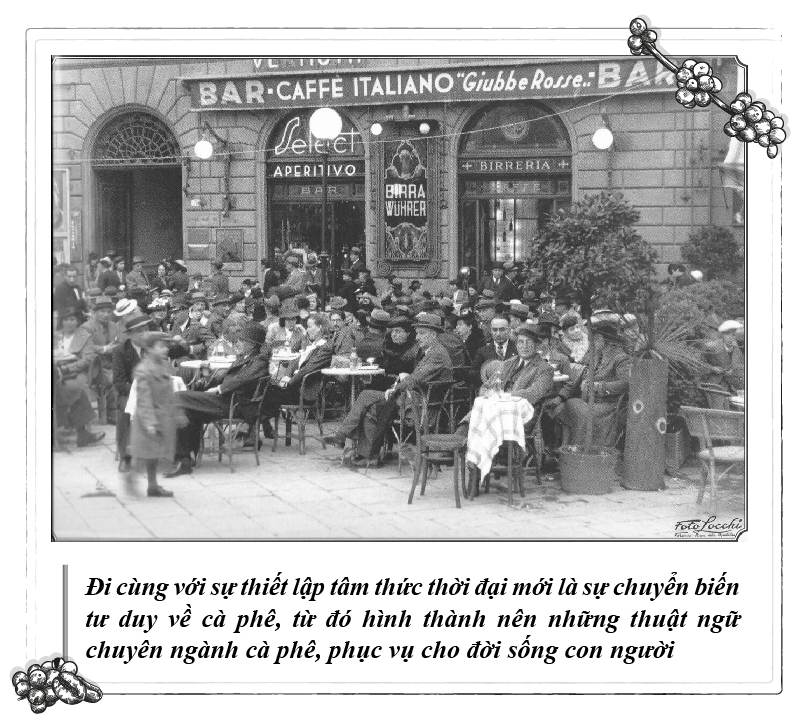
Accompanying the establishment of a new era mindset was a shift in perceptions about coffee, which led to the creation of specialized coffee terminology to serve human life.
Not only does it enrich humanity’s linguistic repertoire, but these new concepts, words, and terminologies have also shaped the unique cultural identities of many nations and peoples. For instance, concepts like the Moka pot, Espresso, Cappuccino, Mocha, Latte, or the Galateo del Caffè—the code of serving and enjoying coffee—have defined Italian coffee culture, tied to high standards and advanced technical applications. Meanwhile, La Débelloire—the first coffee infusion system, the French Press, and Café filtré (filtered coffee) reflect the refined coffee enjoyment culture of France. Terms like “Instant Coffee” and “Coffee Break” embody the dynamic and modern coffee culture of America.
Parallel to the growing demand for interaction, connection, and self-expression, a new direction in coffee appreciation emerged, leading to the birth of many new concepts. Gourmet Coffee caters to connoisseurs knowledgeable about coffee varieties, origins, roasting techniques, and unique preparations. Café cocktails, combining coffee with alcoholic beverages, bring vibrancy to life. Instant Coffee supports a dynamic lifestyle, driving the creation of many social values. Capsule Coffee points to a luxurious, affluent way of living. In addition, various new types of coffee spaces have emerged with unique names. Examples include Readings Coffee, where intellectual elites and academic experts present new works or ideas; Street Alternative Coffee, which creates an artistic playground for young people; Coffee Party Movement, gathering ordinary citizens to advocate for contemporary issues; Café Design, dedicated to showcasing artworks ranging from sculpture and painting to photography and architecture; and Café philosophique, bringing philosophy to the streets to help people gain clarity in their search for the meaning of life.
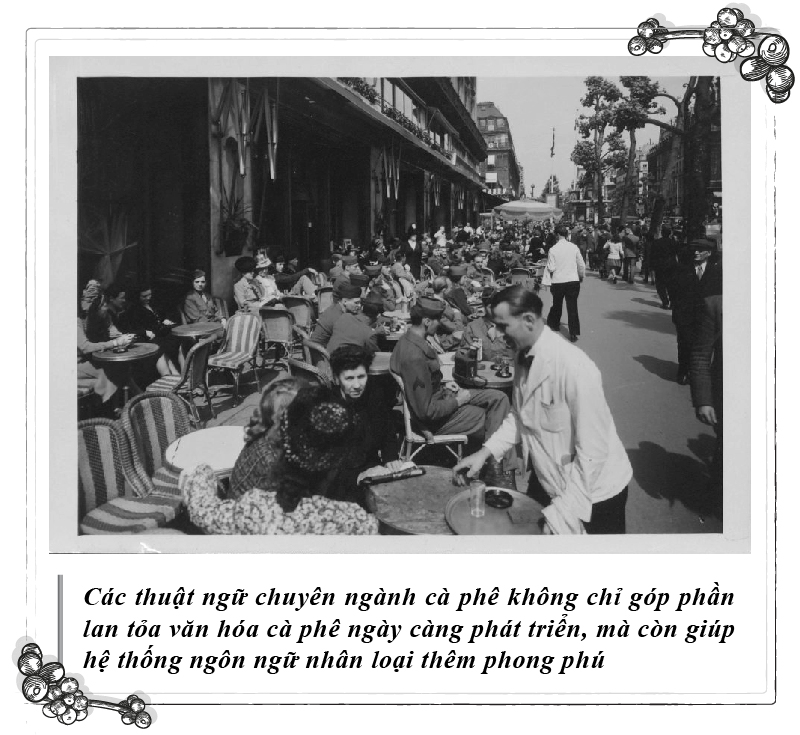
Specialized coffee terminology not only contributes to the growing spread of coffee culture but also enriches the linguistic system of humanity.
In the book “How Language Began: The Story of Humanity’s Greatest Invention” by linguist Daniel Leonard Everett, the evolution of language is explored. This is one of the valuable works included in the “Life-Changing Foundational Library”, carefully selected with dedication by Trung Nguyên Legend Group’s Founder and Chairman, Đặng Lê Nguyên Vũ. According to the book, every language reflects the history, environment, and communication needs of the community that uses it. Language is not merely a tool for transmitting information but also a medium of thought, enabling people to express themselves, generate new ideas, and build culture. Notably, language is constantly evolving over time under the influence of society, giving rise to new words and ensuring that language continues to develop to meet human needs.
From the first coffee beans accidentally discovered and used by Ethiopians through roasting, grinding, and boiling, coffee has evolved through cultural exchange, the relentless progress of the times, and human creativity. It quickly became a medium for communication and connection, spreading the cultural identity of nations and peoples. The value of coffee has continually changed and developed to align with the new aspirations of society, serving human life and contributing to the advancement of human civilization with its rich and diverse linguistic system.
Readers are cordially invited to watch the series of The Tao of Coffee videos posted on https://bit.ly/caphetrietdao
THE REAL COFFEE
ROASTED ONLY FOR PEOPLE OF WISDOM!
Coming up: Coffeehouses in the development of Prague linguistics


